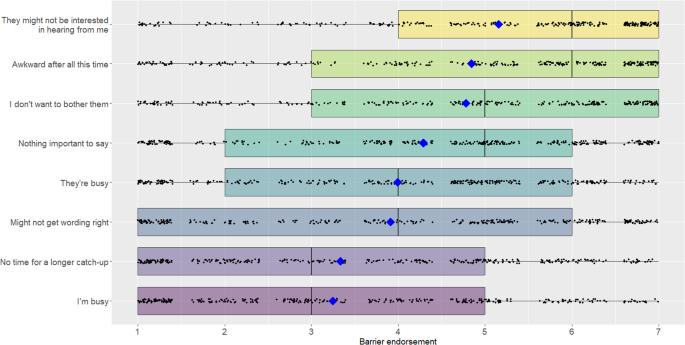People are surprisingly hesitant to reach out to old friends
引用次数: 0
Abstract
Social relationships provide one of the most reliable paths to happiness, but relationships can fade for various reasons. While it does not take much to reinitiate contact, here we find that people are surprisingly reluctant to do so. Specifically, most people reported losing touch with an old friend yet expressed little interest in reaching out (Studies 1-2, Ns = 401 and 199). Moreover, fewer than one third of participants sent a message to an old friend, even when they wanted to, thought the friend would be appreciative, had the friend’s contact information, and were given time to draft and send a message (Studies 3-4, Ns = 453 and 604). One reason for this reluctance may be that old friends feel like strangers. Supporting this possibility, participants were no more willing to reach out to an old friend than they were to talk to a stranger (Study 5, N = 288), and were less willing to contact old friends who felt more like strangers (Study 6, N = 319). Therefore, in Study 7 (N = 194), we adapted an intervention shown to ease anxieties about talking to strangers and found that it increased the number of people who reached out to an old friend by two-thirds. Individuals seldom reach out to old friends with whom they have lost touch. Interventions focused on changing attitudes were ineffective, but practicing reaching out to current friends first successfully encouraged people to reach out to old friends.

人们在联系老朋友时出奇地犹豫不决
社会关系是通往幸福的最可靠途径之一,但由于种种原因,人际关系可能会淡化。虽然重新建立联系并不需要花费太多时间,但我们发现人们却出人意料地不愿意这样做。具体来说,大多数人表示与老朋友失去了联系,但却没有兴趣主动联系(研究 1-2,人数 = 401 和 199)。此外,只有不到三分之一的参与者向老朋友发送了信息,即使他们想这样做,认为朋友会感激他们,有朋友的联系方式,并且有时间起草和发送信息(研究 3-4,人数 = 453 和 604)。这种不情愿的原因之一可能是老朋友给人的感觉就像陌生人。为了证实这种可能性,参与者主动联系老朋友的意愿并不比与陌生人交谈的意愿高(研究 5,人数 = 288),而且他们更不愿意联系感觉更像陌生人的老朋友(研究 6,人数 = 319)。因此,在研究 7(N = 194)中,我们调整了一项干预措施,该措施被证明可以缓解与陌生人交谈时的焦虑,结果发现该措施使主动联系老朋友的人数增加了三分之二。人们很少主动联系失去联系的老朋友。以改变态度为重点的干预措施效果不佳,但先与现在的朋友联系的做法成功地鼓励了人们与老朋友联系。
本文章由计算机程序翻译,如有差异,请以英文原文为准。
求助全文
约1分钟内获得全文
求助全文

 求助内容:
求助内容: 应助结果提醒方式:
应助结果提醒方式:


